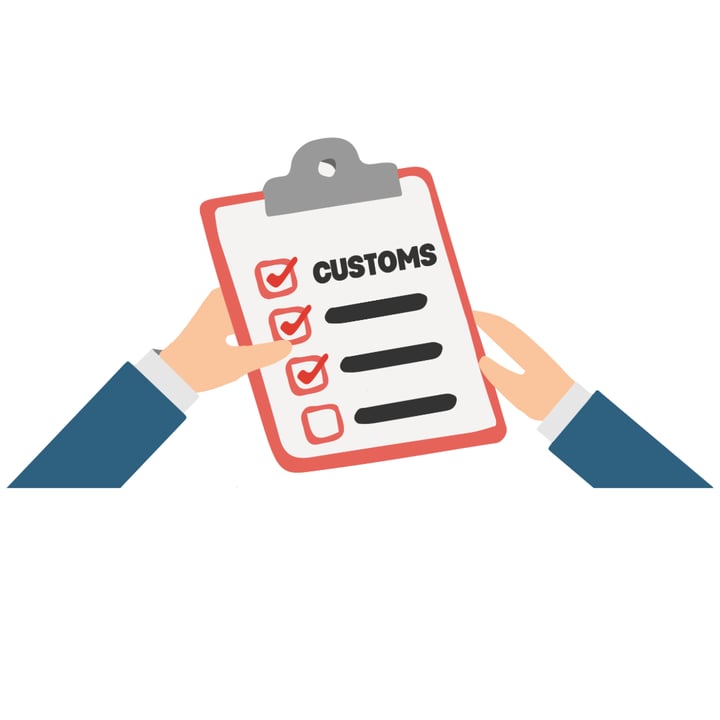- Resources
- Incoterms DDP and DAP
Incoterms DDP and DAP

Incoterms is an abbreviation for "International Commercial Terms", i. e. the rules of the game, such as payment and delivery terms in traditional trade. The two most common Incoterms are Incoterms DDP and Incoterms DAP. The following video provides a brief but comprehensive explanation of both Incoterms.
Is your shipping and logistics setup working optimally? With the Optimizer, you can get a personalised report with specific suggestions for improvement in just 13 questions.
How does Incoterms DAP (Delivery at Place) work?
For deliveries on the basis of the incoterms DAP, the seller is responsible for the delivery of the goods including transport costs to the named destination, i. e. the buyer's premises. However, the costs of carrying out all necessary import formalities are explicitly excluded. All duties and taxes in connection with the import in the country of destination must be paid by the buyer or recipient. If an order exceeds a certain value of goods (in Switzerland CHF 62), the order becomes subject to VAT. The consignment is therefore cleared through customs in the country of destination.Who pays with DAP?
If the VAT is above the exemption limits, all duties must be paid before, during or after receipt of the shipment. Industrial tariffs were abolished on 1 January 2024 and no longer apply to cross-border e-commerce. You can find more information in our blog "Abolition of industrial tariffs".
However, shoppers are often unaware that a) they are ordering from abroad and b) are liable for VAT outside the EU zone.
If the Incoterm is not clearly defined when ordering in the online shop, your customers will rightly be annoyed! This naturally leads to dissatisfied customers, poor ratings and damage to your online shop's image.
How does Incoterms DDP (Delivered Duty Paid) work?
For deliveries on the basis of the incoterms DDP, the seller must deliver the goods at his own cost and risk to a destination in the country of importation, must complete all the formalities involved and pay all import duties in addition to all costs. DDP is similar to DAP, but includes the payment of customs and taxes ahead of delivery.Who pays with DDP?
Customers no longer have to pay anything on receipt of the consignment; the goods are delivered in the same way as a national delivery.
The senders are responsible for customs clearance. This means that if import duties are incurred, these will be charged to the sender (VAT).
Since July 1, 2021 there is a new regulation in the EU for shipments from third countries like Switzerland. If you regularly ship goods up to a value of EUR 150, you can make use of the Import-One-Stop-Shop (IOSS) portal. More information about what IOSS is and how you can benefit from it as a Swiss retailer can be found on our blog "OSS and IOSS".
Pro tip
DDP is clearly ahead in customer satisfaction. Be sure to mention DDP in your terms of delivery. This way your customer can get comprehensive information before ordering and you increase your repurchase rate.
Pro tip
DDP is clearly ahead in customer satisfaction. Be sure to mention DDP in your terms of delivery. This way your customer can get comprehensive information before ordering and you increase your repurchase rate.
The Incoterms DDP at a glance
DDP:
- Consignments are no longer held at the border because of missing documents.
- Shipments are delivered duty paid—your customer does not have to pay VAT or customs fees. He gets his package delivered like a national consignment.
- If you mention DDP delivery in your online shop, you can convince foreign shoppers to buy from you.
- If you clearly state that the final price includes VAT and customs fees during the check-out process, your customers will finalise their orders much more often.
- Depending on the shipping method, the recipient may not necessarily be at home when the parcel arrives (e. g. delivery without signature). This ensures greater customer satisfaction.
Optimiere Dein Versand- und Logistiksetup mit wenigen Klicks
Dein Schlüssel zur Logistik-Optimierung
Bist Du bereit, Deinen internationalen Versand auf das nächste Level zu heben? Mit unserem Cross-Border-E-Commerce Optimizer erhältst Du in nur wenigen Minuten wertvolle Einblicke und konkrete Handlungsempfehlungen für Dein internationales Versand- und Logistiksetup. Beantworte einfach 13 Fragen und erhalte einen personalisierten Report, der Dir zeigt, wie Du Deine globale Logistik optimieren und Dein Geschäft ausbauen kannst.
Optimisez votre configuration d'expédition et de logistique en quelques clics
La clé de l'optimisation de la logistique
Optimise your shipping and logistics setup with just a few clicks
Your key to logistics optimisation
Ottimizzi la configurazione della spedizione e della logistica con pochi clic.
La sua chiave per ottimizzare la logistica
È pronto a portare le sue spedizioni internazionali ad un livello superiore? Con il nostro Optimizer per l'e-commerce transfrontaliero, può ottenere in pochi minuti preziose intuizioni e raccomandazioni concrete per la sua spedizione internazionale e la configurazione logistica. Basta rispondere a 13 domande e ricevere un rapporto personalizzato che le mostra come ottimizzare la sua logistica globale e far crescere la sua attività.




